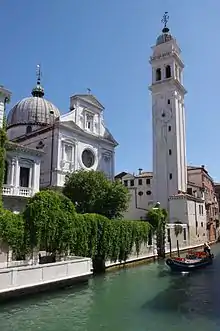San Giorgio dei Greci
San Giorgio dei Greci (Greek: Ἅγιος Γεώργιος τῶν Ἑλλήνων, romanized: ´Agios Geórgios ton Ellínon, lit. 'Saint George of the Greeks') is a church in the sestiere (neighborhood) of Castello, Venice, northern Italy. It was the center of the Scuola dei Greci, the Confraternity of the Greeks in Venice.
| San Giorgio dei Greci | |
|---|---|
 San Giorgio dei Greci with its campanile | |
| Religion | |
| Affiliation | Greek Orthodox |
| Province | Venice |
| Location | |
| Location | Venice, Italy |
 Shown within Venice  San Giorgio dei Greci (Italy) | |
| Geographic coordinates | 45.4354°N 12.3448°E |
For centuries, despite the close ties of Venice to the Byzantine world (Venice has been part of the Byzantine Empire), the Greek Orthodox rite was not permitted in Venice. In 1498, the Greek community in Venice gained the right to found the Scuola de San Nicolò dei Greci, a confraternity which aided members of that community. In 1539, after protracted negotiations, the papacy allowed the construction of the church of San Giorgio, financed by a tax on all ships from the Orthodox world.
Construction was started by Sante Lombardo, and from 1548, by Giannantonio Chiona. The belltower was built in 1592. The interior has a monument to Gabriele Seviros (1619) by Baldassarre Longhena. The dome of the church was frescoed with the Last Judgement (1589–93) by Giovanni Kyprios. The iconostasis employed Kyprios, Tommaso Bathas, Benedetto Emporios, and Michael Damaskinos. Emanuele Tzane-Buniales, a priest and hagiographer from Crete, frescoed the Saints Simeon and Alypios, ascetic hermits, atop the pilasters.
Amongst the treasures in this church are three icons which Anna Notaras, daughter of Loukas Notaras, the last megas doux of the Byzantine Empire, brought with her to Italy before 1453, and she later gave to the Scuola de San Nicolò dei Greci in trust for when a church observing the Greek Orthodox faith could be constructed. These icons comprise: one of Christ in His glory surrounded by symbols of the four Evangelists and figures of the 12 Apostles; another of Christ Pantokrator; and the third is an image of the Virgin Hodegetria.[1]
Near the church lies the Flanginian School, a Greek teachers' school, which today houses the Hellenic Institute of Byzantine and Post-Byzantine Studies in Venice. The Museum was established by Sophia Antoniadis.[2]
References
- Nicol, Donald M. (1994). The Byzantine Lady: Ten Portraits, 1250–1500. Cambridge and New York: Cambridge University Press. pp. 108ff. ISBN 0-521-45531-6.
- Manousakas, Manousos (15 February 1972). ""The facts and issues: Sofia A. Antoniadis"". Nea Estia. 91: 269–271.
- Manno, Antonio (2004). The Rizzoli Art Guides (ed.). The Treasures of Venice. New York: Rizzoli International Publications. pp. 256–257.
- Mathieu Grenet, La fabrique communautaire. Les Grecs à Venise, Livourne et Marseille, 1770-1840, Athens and Rome, École française d'Athènes and École française de Rome, 2016 (ISBN 978-2-7283-1210-8)
| Wikimedia Commons has media related to San Giorgio dei Greci (Venice). |
External links
- Archdiocese of Italy (Patriarchate of Constantinople)
- Hellenic Institute of Byzantine and Post-Byzantine studies in Venice